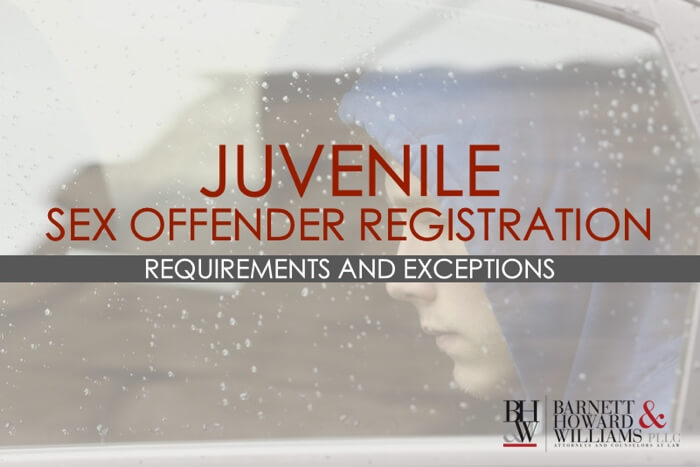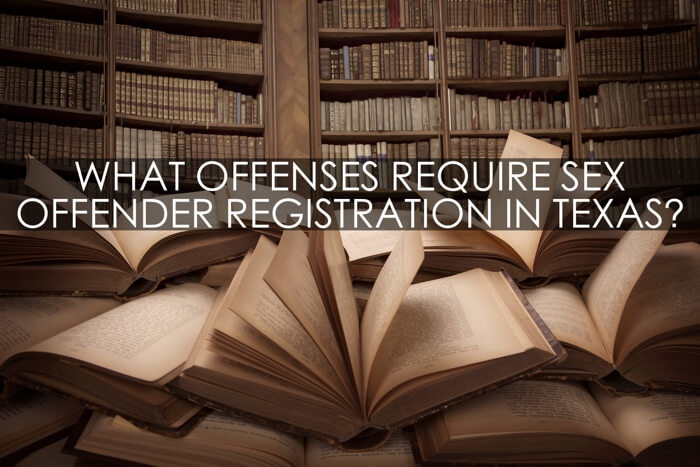
 In 2005, the Texas legislature enacted House Bill 867, which allows for the early termination of the requirement for an individual to register as a sex offender if it is determined that the person is no longer a continuing threat to society.
In 2005, the Texas legislature enacted House Bill 867, which allows for the early termination of the requirement for an individual to register as a sex offender if it is determined that the person is no longer a continuing threat to society.
If you have been required to register as a sex offender in Texas, you may be eligible for this deregistration after a minimum time of registration. Whether you will be eligible for early termination will depend on whether the registerable offense meets specific criteria under State and Federal laws. In addition to determining whether your offense meets these criteria, there are other procedures you must follow and a judicial order that must be granted in order to obtain early termination. Because of the intricacies of this process and the requirement of filing for the judicial order, we recommend that you hire an experienced criminal defense lawyer to help you with the sex offender deregistration process.
Do I Qualify for Early Termination of My Obligation to Register as a Sex Offender?
1. ONLY 1 CONVICTION: The first requirement to qualify for deregistration as a sex offender is that you must only have one single reportable adjudication or conviction that requires registration under Texas Code of Criminal Procedure Chapter 62.
2. EXCEED THE FEDERAL MINIMUM TIME: The second requirement is that the minimum registration period for your reportable conviction must exceed the minimum required registration under Federal Law. Eligible offenses can be found here. For most offenses, the Federal minimum is 10 years. Texas Code of Criminal Chapter 62 specifically states that if an offense is not on this list, then it does not qualify.
Application to the Council on Sex Offender Treatment
To determine eligibility, you must submit an application to the Council of Sex Offender Treatment. To do this, you must fill out the Initial Eligibility Checklist. You will also need to obtain your Texas Department of Public Safety and FBI criminal histories. It might take a few weeks, but the Council on Sex Offender Treatment will respond by sending you a letter telling you whether you are an eligible candidate for deregistration.
If Eligible, What are the Next Steps to Deregister as a Sex Offender in Texas?
Just because an offense meets the initial requirements of deregistration, it does not mean that the person automatically qualifies for deregistration. While initially eligible, the person must move to the next steps of the procedure.
Deregistration Evaluation
Once it is determined that an offense is eligible, the next step to deregister is to undergo a risk assessment known as a Deregistration Evaluation. The person applying for deregistration is financially responsible for paying for this risk assessment and this assessment must be conducted by one of the 22 deregistration specialists that have been authorized by the Texas Council on Sex Offender Treatment. Your attorney can put you in contact with one of these specialists to have them conduct the assessment.
Judicial Order from the Original Court
The final step is to obtain an Order Granting Early Termination from a judge. To obtain an Order you must submit a Motion for Early Termination to the judge in the court that originally presided over your case. This motion must also be accompanied by certified copy of the risk assessment report prepared by the specialist in addition to a written explanation of the offense’s eligibility. After filing this Motion, the court will likely grant you a hearing by the judge where you will have an opportunity to present evidence to pursuade the judge to sign the Order Granting Early Termination. Because of this process, it’s highly recommended that you have an attorney who can help you with this process and hearing.
Are There Any Other Processes to Avoid Registering as a Sex Offender?
Under Texas Code of Criminal Procedure Section 42.017 and 42A.105, there are some limited remedies available to a person that’s otherwise required to register as a sex offender due to an offense of Indecency with a Child or Sexual Assault. Specifically, for these offenses, if:
- at the time of the offense, you were not more than four years older than the victim or intended victim and the victim or intended victim was at least 15 years of age, and
- the conviction is based solely on the ages of the defendant and the victim or intended victim at the time of the offense. Also, this must be the result of a single reportable adjudication or conviction.
If the above criteria are met, then under Texas Code of Criminal Procedure 62.301, a person may petition the court anytime at or after the date of the person’s sentencing for an exemption to register as a sex offender. An order issued under this exemption does not expire, but the court is required to withdraw the order if a person receives a subsequent reportable conviction or adjudication.
What Happens if an Order for Early Termination of the Duty to Register as a Sex Offender is Granted?
If deregistration is granted, then a person is no longer required to register as a sex offender. Getting an order for early termination does not destroy the records or remove the conviction from a person’s record, but it does mean that the threat of a new felony case being filed for failure to register is no longer a possibility. Your name will also be removed from the Texas Sex Offender Registry database.
Free Consultation | Tarrant County Deregistration Attorneys
If, after reading this article, you believe that you or a loved one might qualify for sex offender deregistration, contact our team today for a free case evaluation. We would be happy to help you get the sex offender registration requirement behind you. Contact us at (817) 993-9249.


 In February of 2016,
In February of 2016, 
 In today’s world Internet access has become virtually unlimited. And, with new technology come new problems. These problems have led the Supreme Court to address the challenge modern day Internet access has created for the First Amendment in the landmark case,
In today’s world Internet access has become virtually unlimited. And, with new technology come new problems. These problems have led the Supreme Court to address the challenge modern day Internet access has created for the First Amendment in the landmark case, 

 In Texas, the law governing sex offender registration contains several provisions that apply specifically to juveniles. This means that sex offender registration works differently in juvenile cases than it does in adult cases. This article will highlight how sex offender registration works in the Texas juvenile justice system and why this is an appropriate approach to take in these cases. This article will not discuss exemptions to the sex offender registration law for certain young adult offenders.
In Texas, the law governing sex offender registration contains several provisions that apply specifically to juveniles. This means that sex offender registration works differently in juvenile cases than it does in adult cases. This article will highlight how sex offender registration works in the Texas juvenile justice system and why this is an appropriate approach to take in these cases. This article will not discuss exemptions to the sex offender registration law for certain young adult offenders.
 It’s no secret that there are certain offenses that require individuals to register themselves on the sex offender registry. However, what are those offenses? How long is a person required to register?
It’s no secret that there are certain offenses that require individuals to register themselves on the sex offender registry. However, what are those offenses? How long is a person required to register?





